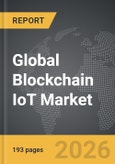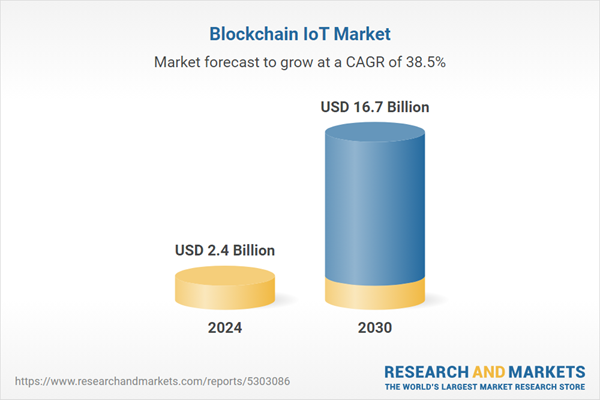Global Blockchain IoT Market - Key Trends & Drivers Summarized
How is Blockchain Reshaping the IoT Ecosystem?
Blockchain is reshaping the Internet of Things (IoT) ecosystem by providing a secure, decentralized framework for managing the vast networks of connected devices and the massive amounts of data they generate. IoT devices, from smart homes and industrial sensors to autonomous vehicles, require secure, real-time data exchange and coordination to function efficiently. However, traditional centralized systems often struggle to handle the scale, complexity, and security challenges of IoT networks. Blockchain addresses these issues by offering a decentralized ledger that can securely record and verify all data exchanges between IoT devices, without relying on a central authority. This creates a more resilient and efficient IoT ecosystem, where devices can communicate and transact autonomously in real time.Blockchain's decentralized nature also enhances the security of IoT networks, which are often vulnerable to cyberattacks. With each device acting as a node in the blockchain, data is encrypted and distributed across the network, making it nearly impossible for hackers to compromise the entire system. This is particularly important for critical IoT applications such as healthcare devices, smart grids, and autonomous vehicles, where data integrity and security are paramount. In addition to enhancing security, blockchain streamlines the management of IoT networks by automating processes such as device authentication, data validation, and payments for services, all through the use of smart contracts.
How Does Blockchain Enhance IoT Security and Privacy?
Security and privacy are two of the most significant challenges in IoT, and blockchain offers a powerful solution by creating a decentralized, tamper-proof system for managing IoT data and device interactions. Traditional IoT networks rely on centralized cloud servers to store and process data, which makes them vulnerable to cyberattacks and data breaches. Blockchain eliminates this single point of failure by distributing data across a network of devices, ensuring that no single entity controls the entire system. Each transaction or data exchange is verified by multiple nodes in the blockchain, making it extremely difficult for malicious actors to alter or manipulate data.Blockchain also improves privacy in IoT by giving users greater control over their data. In traditional IoT ecosystems, data collected by smart devices is often stored in centralized databases owned by manufacturers or service providers, raising concerns about how that data is used and shared. With blockchain, users can decide which entities have access to their data and under what conditions. Smart contracts can enforce these permissions, ensuring that data is only shared with authorized parties. This level of control not only enhances user privacy but also helps IoT companies comply with data protection regulations such as the General Data Protection Regulation (GDPR) in the European Union.
How Can Blockchain Optimize IoT Device Management and Automation?
Blockchain is optimizing IoT device management and automation by providing a secure, decentralized platform for coordinating the activities of millions of connected devices. In traditional IoT networks, devices rely on a central authority to authenticate themselves, manage data exchanges, and execute commands. This centralized model can become inefficient and prone to bottlenecks as the number of connected devices grows. Blockchain overcomes these limitations by enabling peer-to-peer interactions between devices, where each device can authenticate itself and interact with other devices autonomously. This decentralization reduces the need for intermediary platforms and improves the overall efficiency of IoT networks.Smart contracts further enhance automation in IoT by allowing devices to execute predefined tasks without human intervention. For instance, in a smart home environment, IoT sensors could automatically adjust heating or lighting based on real-time conditions and smart contracts could automate payments for energy usage. In industrial IoT applications, blockchain can enable machines to autonomously order replacement parts or schedule maintenance services when performance data indicates a potential issue. This kind of real-time, automated decision-making improves operational efficiency, reduces downtime, and lowers maintenance costs. Moreover, blockchain's transparent and auditable nature provides a clear record of all device interactions, which is valuable for tracking performance and ensuring compliance with industry standards.
What Factors Are Driving the Growth of Blockchain in IoT?
The growth in the blockchain IoT market is driven by several factors, including the increasing number of connected devices, the need for enhanced security and privacy, and the demand for more efficient IoT management systems. As IoT devices proliferate across industries such as healthcare, manufacturing, and smart cities, the need for secure, scalable, and decentralized systems to manage these networks is becoming critical. Blockchain provides a robust solution by offering a secure, tamper-proof ledger for recording and verifying all device interactions, making it an attractive option for IoT deployments in sensitive or high-security environments.Security concerns are also a major driver of blockchain adoption in IoT. With the rise of cyberattacks and data breaches, IoT companies are increasingly turning to blockchain to protect their networks and ensure the integrity of their data. Blockchain's decentralized architecture reduces the risk of hacking, while its encryption and data verification capabilities provide a higher level of security than traditional centralized systems. In addition, regulatory pressure related to data privacy and protection is pushing companies to adopt blockchain-based IoT solutions that give users greater control over their data and ensure compliance with regulations such as GDPR.
Technological advancements are further fueling the blockchain IoT market's growth. The integration of blockchain with IoT, AI, and edge computing enables more efficient data processing and real-time decision-making in IoT networks. For example, AI algorithms can analyze blockchain-verified data from IoT devices to optimize processes, predict maintenance needs, or enhance security measures. The growing adoption of 5G technology is also expected to accelerate the deployment of blockchain IoT networks, as the increased speed and reduced latency of 5G networks make it easier to manage and secure large-scale IoT ecosystems. Lastly, government initiatives and industry collaborations are playing a crucial role in supporting the development and implementation of blockchain IoT solutions, further driving market growth.
Report Scope
The report analyzes the Blockchain IoT market, presented in terms of market value (US$ Thousand). The analysis covers the key segments and geographic regions outlined below.- Segments: Component (Software & Platform, Services, Hardware); Application (Data Security, Asset Tracking & Management, Data Sharing / Communication, Smart Contracts, Other Applications); End-Use (Transportation & Logistics, Manufacturing, Energy & Utility, Smart City, Other End-Uses).
- Geographic Regions/Countries:World; United States; Canada; Japan; China; Europe (France; Germany; Italy; United Kingdom; and Rest of Europe); Asia-Pacific; Rest of World.
Key Insights:
- Market Growth: Understand the significant growth trajectory of the Software & Platform Component segment, which is expected to reach US$11.4 Billion by 2030 with a CAGR of a 38.4%. The Services Component segment is also set to grow at 37.8% CAGR over the analysis period.
- Regional Analysis: Gain insights into the U.S. market, valued at $732.7 Million in 2024, and China, forecasted to grow at an impressive 35.6% CAGR to reach $2.2 Billion by 2030. Discover growth trends in other key regions, including Japan, Canada, Germany, and the Asia-Pacific.
Why You Should Buy This Report:
- Detailed Market Analysis: Access a thorough analysis of the Global Blockchain IoT Market, covering all major geographic regions and market segments.
- Competitive Insights: Get an overview of the competitive landscape, including the market presence of major players across different geographies.
- Future Trends and Drivers: Understand the key trends and drivers shaping the future of the Global Blockchain IoT Market.
- Actionable Insights: Benefit from actionable insights that can help you identify new revenue opportunities and make strategic business decisions.
Key Questions Answered:
- How is the Global Blockchain IoT Market expected to evolve by 2030?
- What are the main drivers and restraints affecting the market?
- Which market segments will grow the most over the forecast period?
- How will market shares for different regions and segments change by 2030?
- Who are the leading players in the market, and what are their prospects?
Report Features:
- Comprehensive Market Data: Independent analysis of annual sales and market forecasts in US$ Million from 2024 to 2030.
- In-Depth Regional Analysis: Detailed insights into key markets, including the U.S., China, Japan, Canada, Europe, Asia-Pacific, Latin America, Middle East, and Africa.
- Company Profiles: Coverage of players such as Amazon, Ambrosus, Atonomi, Cisco Systems, Discovery and more.
- Complimentary Updates: Receive free report updates for one year to keep you informed of the latest market developments.
Some of the 53 companies featured in this Blockchain IoT market report include:
- Amazon
- Ambrosus
- Atonomi
- Cisco Systems
- Discovery
- Ethereum Foundation
- Factom
- Filament
- IBM
- Intel
This edition integrates the latest global trade and economic shifts into comprehensive market analysis. Key updates include:
- Tariff and Trade Impact: Insights into global tariff negotiations across 180+ countries, with analysis of supply chain turbulence, sourcing disruptions, and geographic realignment. Special focus on 2025 as a pivotal year for trade tensions, including updated perspectives on the Trump-era tariffs.
- Adjusted Forecasts and Analytics: Revised global and regional market forecasts through 2030, incorporating tariff effects, economic uncertainty, and structural changes in globalization. Includes historical analysis from 2015 to 2023.
- Strategic Market Dynamics: Evaluation of revised market prospects, regional outlooks, and key economic indicators such as population and urbanization trends.
- Innovation & Technology Trends: Latest developments in product and process innovation, emerging technologies, and key industry drivers shaping the competitive landscape.
- Competitive Intelligence: Updated global market share estimates for 2025, competitive positioning of major players (Strong/Active/Niche/Trivial), and refined focus on leading global brands and core players.
- Expert Insight & Commentary: Strategic analysis from economists, trade experts, and domain specialists to contextualize market shifts and identify emerging opportunities.
Table of Contents
Companies Mentioned (Partial List)
A selection of companies mentioned in this report includes, but is not limited to:
- Amazon
- Ambrosus
- Atonomi
- Cisco Systems
- Discovery
- Ethereum Foundation
- Factom
- Filament
- IBM
- Intel
Table Information
| Report Attribute | Details |
|---|---|
| No. of Pages | 193 |
| Published | February 2026 |
| Forecast Period | 2024 - 2030 |
| Estimated Market Value ( USD | $ 2.4 Billion |
| Forecasted Market Value ( USD | $ 16.7 Billion |
| Compound Annual Growth Rate | 38.5% |
| Regions Covered | Global |









